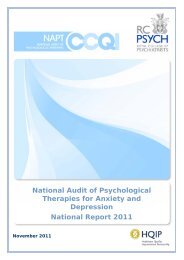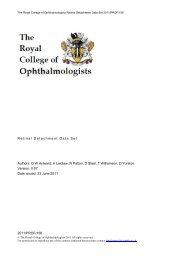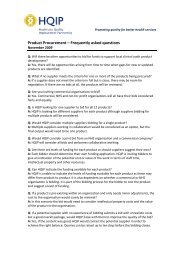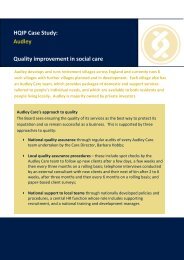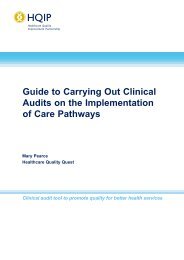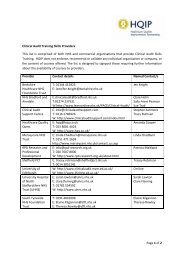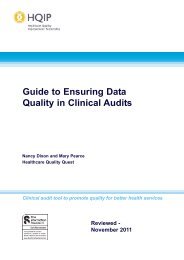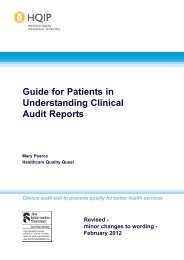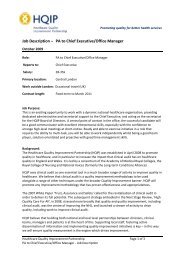Good Governance Handbook - HQIP
Good Governance Handbook - HQIP
Good Governance Handbook - HQIP
You also want an ePaper? Increase the reach of your titles
YUMPU automatically turns print PDFs into web optimized ePapers that Google loves.
<strong>Good</strong> governance means:<br />
• Focusing on the organisation's purpose and on outcomes for citizens and<br />
service users.<br />
• Performing effectively in clearly defined functions and roles.<br />
• Promoting values for the whole organisation and demonstrating the values of<br />
good governance through behaviour.<br />
• Taking informed, transparent decisions and managing risk.<br />
• Developing the capacity and capability of the governing body to be effective.<br />
• Engaging stakeholders and making accountability real.<br />
6.3 The Nolan Principles of Public Life<br />
”The only way to be sure that they do the right thing is to keep an eye<br />
on them, to challenge them, to hold them to account and, above all,<br />
to take part in them.” Nolan (1996)<br />
The Nolan Committee 14 concluded that public bodies should draw up ‘Codes of<br />
Conduct’ incorporating the following principles, and that internal systems for<br />
maintaining standards should be supported by independent scrutiny.<br />
The Seven Principles of Public Life:<br />
1. Selflessness: Holders of public office should take decisions solely in terms of<br />
the public interest. They should not do so in order to gain financial or other<br />
material benefits for themselves, their family, or their friends.<br />
2. Integrity: Holders of public office should not place themselves under any<br />
financial or other obligation to outside individuals or organisations that might<br />
influence them in the performance of their official duties.<br />
3. Objectivity: In carrying out public business, including making public<br />
appointments, awarding contracts, or recommending individuals for rewards<br />
and benefits, holders of public office should make choices on merit.<br />
4. Accountability: Holders of public office are accountable for their decisions and<br />
actions to the public and must submit themselves to whatever scrutiny is<br />
appropriate to their office.<br />
5. Openness: Holders of public office should be as open as possible about all the<br />
decisions and actions that they take. They should give reasons for their<br />
decisions and restrict information only when the wider public interest clearly<br />
demands.<br />
6. Honesty: Holders of public office have a duty to declare any private interests<br />
relating to their public duties and to take steps to resolve any conflicts arising<br />
in a way that protects the public interest.<br />
7. Leadership: Holders of public office should promote and support these<br />
www.good-governance.org.uk 24



